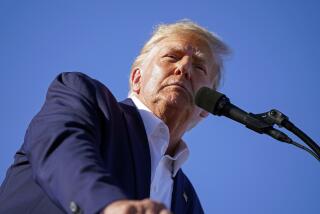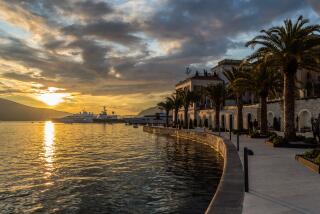Global Asset Search Is Expected as Result of Milosevic Charges
- Share via
WASHINGTON — The indictment of Yugoslav President Slobodan Milosevic and four associates on war crimes charges is expected to touch off a bizarre treasure hunt as international authorities try to locate and seize their substantial wealth.
It will not be easy.
Milosevic has had plenty of chances to become an expert at hiding funds. From 1978 to 1983, he was president of Beobanka, the largest bank in Yugoslavia--and one that is under investigation by French officials on suspicion of money laundering.
Although there are substantial differences between the Communist Party-driven banking system in place in Yugoslavia 20 years ago and today’s international financial institutions, there is no doubt that Milosevic gained skills that could help him avoid having his money seized.
Officials of Kroll Associates, a worldwide company that specializes in running down the assets of the rich and notorious, say that bank secrecy laws in Cyprus, Switzerland and Liechtenstein, among others, provide ample opportunity to launder and hide money.
As long as the five indicted men stay hunkered down in Belgrade, the Yugoslav and Serbian capital, they probably can avoid arrest almost indefinitely. Therefore, losing their personal fortunes stands as the most likely punishment for Milosevic, Serbian President Milan Milutinovic, Yugoslav Deputy Prime Minister Nikola Sainovic, Serbian Interior Minister Vlajko Stojiljkovic and Gen. Dragoljub Ojdanic, chief of staff of the Yugoslav armed forces.
The warrants issued by the International Criminal Tribunal for the Former Yugoslavia call on all governments to freeze the assets of the five officials, including bank accounts, real estate and other property.
The U.S. Treasury Department immediately issued an order prohibiting Americans, U.S. companies and U.S. branches of overseas companies from having any financial dealings with the five. The Clinton administration froze the assets of a number of Yugoslav officials, including the five, nearly a year ago, so the Treasury order reflects only a slight tightening of existing restrictions.
State Department spokesman James P. Rubin conceded that the U.S. government has been unable to find any funds in the United States controlled by Milosevic or the others.
But he said Washington issued this week’s order in compliance with the tribunal’s request to “create a model for what we would want all countries in the world to do to follow the tribunal’s call on countries to freeze the assets of these five individuals.”
According to Norman Cigar, a retired U.S. government analyst and author of “Genocide in Bosnia,” Milosevic has substantial real estate holdings in Greece as well as secret bank accounts in Cyprus and perhaps other countries.
On Friday, the Cypriot government emphatically denied that its banks are harboring any of Milosevic’s money, saying, “The family of Yugoslav President Slobodan Milosevic does not have any accounts with banks in Cyprus.”
There are no reliable estimates of the total assets of Milosevic and his four aides.
But Cigar and officials with Kroll Associates said that all of them have had ample opportunity to benefit financially from their positions.
“Everybody has a nest egg,” Cigar said.
In addition to using secret accounts in which the owner’s name never appears on bank records, Milosevic is believed to have placed substantial assets in the names of family members and associates who are not under indictment, Cigar said.
Cigar said that Marko Milosevic, the president’s son, is thought to be one of the wealthiest people in the Balkans.
In recent years, locating and recovering the assets of suspect government leaders has become a growth industry.
Kroll Associates has 60 offices in 16 countries. The firm is credited with finding the hidden funds of former Panamanian strongman Manuel A. Noriega, the late Philippine leader Ferdinand E. Marcos and others.
“There are certainly some sophisticated methods and means of moving money around the world, and Milosevic had access to all of them,” said Tom Cash of the Miami office of Kroll Associates. “I can’t imagine anybody better qualified than a former banker.
“We can be sure that investigators will not be able to go to the Cayman Islands and find the name Milosevic on the general ledger.”
Norb Garrett of Kroll’s London office said most successful efforts to track hot money involve funds stolen by deposed dictators and occur when the successor government is willing to invest the time and money needed to follow the money trail.
“If you have the strength of sovereignty on your side, it is not too difficult to recover some assets,” Garrett said. But he added that it is difficult “to get your hands on funds that banks deny ever having received.”
More to Read
Sign up for Essential California
The most important California stories and recommendations in your inbox every morning.
You may occasionally receive promotional content from the Los Angeles Times.













